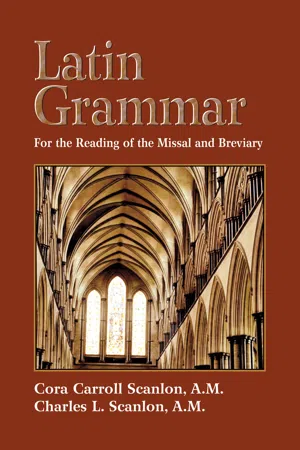
eBook - ePub
Latin Grammar
Preparation for the Reading of the Missal and Breviary
- 334 pages
- English
- ePUB (mobile friendly)
- Available on iOS & Android
eBook - ePub
Latin Grammar
Preparation for the Reading of the Missal and Breviary
About this book
Prepares students to read the Roman Missal and Breviary. 195 pp. of grammar and a 130-page Latin-English glossary, containing all the words in the Roman Missal and the Roman Breviary. Lessons and readings from these two books, plus from the Latin Vulgate Bible. Fantastic tool for the study of Church Latin.
Frequently asked questions
Yes, you can cancel anytime from the Subscription tab in your account settings on the Perlego website. Your subscription will stay active until the end of your current billing period. Learn how to cancel your subscription.
At the moment all of our mobile-responsive ePub books are available to download via the app. Most of our PDFs are also available to download and we're working on making the final remaining ones downloadable now. Learn more here.
Perlego offers two plans: Essential and Complete
- Essential is ideal for learners and professionals who enjoy exploring a wide range of subjects. Access the Essential Library with 800,000+ trusted titles and best-sellers across business, personal growth, and the humanities. Includes unlimited reading time and Standard Read Aloud voice.
- Complete: Perfect for advanced learners and researchers needing full, unrestricted access. Unlock 1.4M+ books across hundreds of subjects, including academic and specialized titles. The Complete Plan also includes advanced features like Premium Read Aloud and Research Assistant.
We are an online textbook subscription service, where you can get access to an entire online library for less than the price of a single book per month. With over 1 million books across 1000+ topics, we’ve got you covered! Learn more here.
Look out for the read-aloud symbol on your next book to see if you can listen to it. The read-aloud tool reads text aloud for you, highlighting the text as it is being read. You can pause it, speed it up and slow it down. Learn more here.
Yes! You can use the Perlego app on both iOS or Android devices to read anytime, anywhere — even offline. Perfect for commutes or when you’re on the go.
Please note we cannot support devices running on iOS 13 and Android 7 or earlier. Learn more about using the app.
Please note we cannot support devices running on iOS 13 and Android 7 or earlier. Learn more about using the app.
Yes, you can access Latin Grammar by Cora Carroll Scanlon,Charles L. Scanlon in PDF and/or ePUB format, as well as other popular books in Theology & Religion & Christian Denominations. We have over one million books available in our catalogue for you to explore.
Information
Table of contents
- Title Page
- Copyright Page
- CONTENTS
- PREFACE
- PRONUNCIATION
- I. Declension. Gender. First declension. Position of adjectives
- II. Second declension. Agreement of adjectives. Conjugation of verbs. Present indicative of esse and posse. Subject pronouns
- III. Third declension. Neuter nouns and adjectives. Declension of adjectives
- IV. Verbs. Present indicative. Active and passive voice of the regular conjugations
- V. Personal pronouns: subject, object, reflexive. Is. Cum with pronouns. Present indicative of ire
- VI. Imperfect tense, active and passive voice. The imperative. Imperfect of esse, posse, ire. Esto, estote
- VII. Fourth declension. Future tense, active and passive voice. Future of esse, posse, ire
- VIII. Fifth declension. Participles. Gerundive. Declension and agreement of participles. Participles of esse, posse, ire
- IX. Perfect tense, active and passive voice. Formation of other perfect tenses. Perfect of esse, posse, ire. Verbs irregular in the perfect. Irregular past participles. Prepositions governing the accusative. Prepositions governing the ablative. In, sub, super
- X. Present subjunctive, active and passive voice. Present subjunctive of esse, posse, ire. Uses of the subjunctive: (a) hope, wish, or command; (b) ut, uti, ne. Clauses of purpose. Other ways of expressing purpose: (a) subjunctive with relative pronoun; (b) gerundive with ad; (c) gerundive with causa; (d) infinitive
- XI. Demonstratives: hic, ille, iste. Intensive pronoun, ipse
- XII. Imperfect subjunctive, active and passive voice. Imperfect subjunctive of esse, posse, ire. Further uses of the subjunctive: (a) result clauses; (b) indirect question; (c) cum meaning when, since, although; (d) conditional sentences of doubt and conditional sentences contrary to fact
- XIII. Third conjugation verbs in -io
- XIV. Deponent verbs. Semideponents
- XV. Relative pronoun, qui. Interrogative, quis. Indefinite pronouns and adjectives. Present indicative, active and passive, of ferre
- XVI. Ablative absolute. Fíeri
- XVII. Indirect discourse, Infinitives
- XVIII. Impersonal verbs. Adjectives of special declension. Uses of the dative: (a) indirect object; (b) verbs compounded with prepositions; (c) certain intransitive verbs; (d) agent with the passive periphrastic; (e) possession; (f) purpose
- XIX. Comparison of adjectives and adverbs. Irregular comparisons. Velle, nolle. Command with nolle. Uses of the ablative: (a) ablative absolute; (b) accompaniment; (c) comparisons; (d) agent; (e) cause; (f) degree of difference; (g) manner; (h) means or instrument; (i) place; (j) quality or description; (k) specification; (1) separation; (m) time when; (n) with certain prepositions; (o) after certain deponent verbs
- XX. Questions, -ne, nonne, num, numquid. Double questions, utrum . . . an, -ne an, an. Etiam and non as adverbial particles. Defective verbs. Uses of the accusative: (a) direct object; (b) after certain prepositions; (c) subject of infinitive in indirect discourse; (d) duration of time and extent of space
- APPENDIX
- LATIN-ENGLISH VOCABULARY